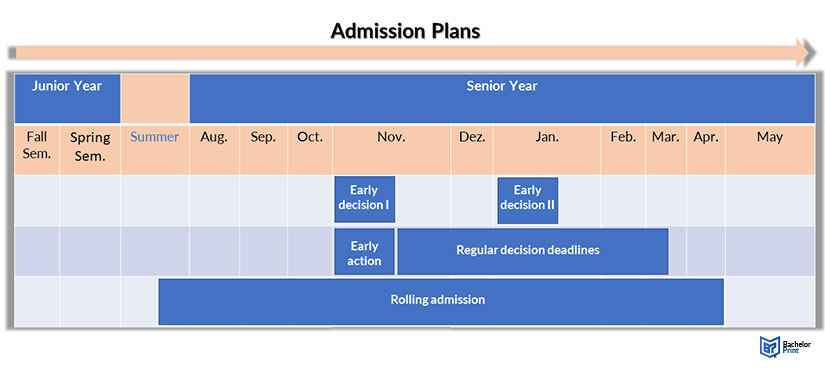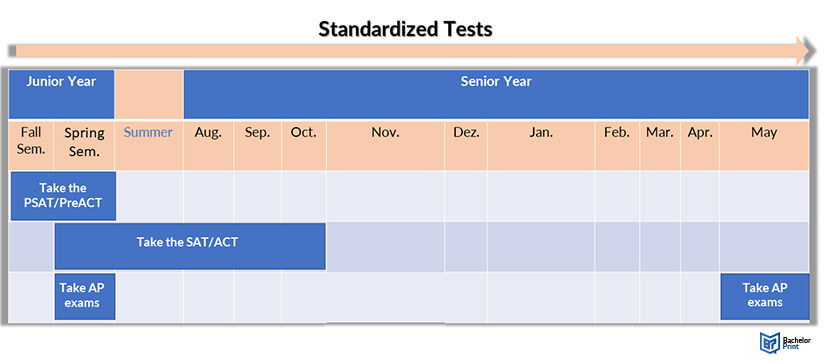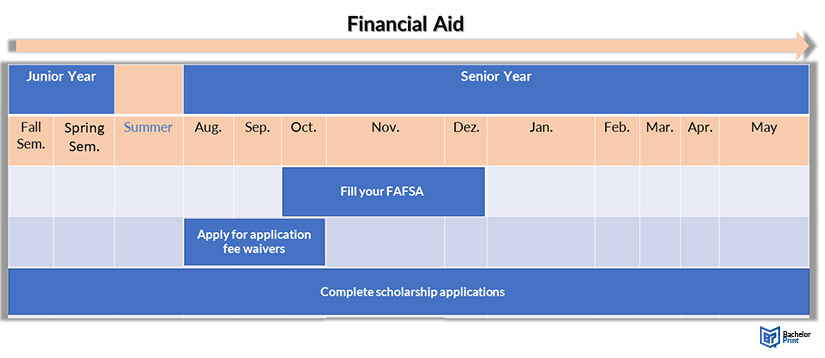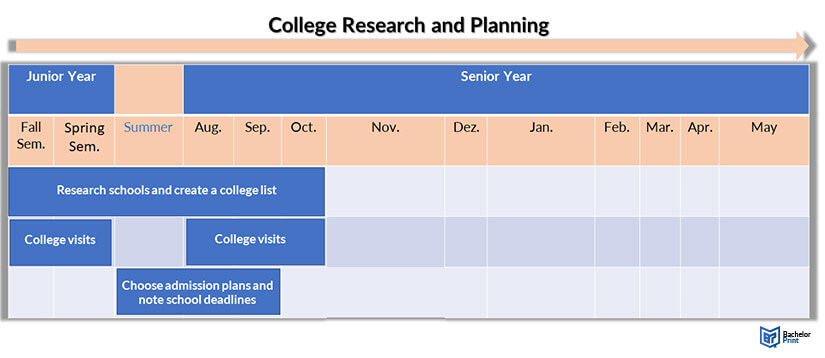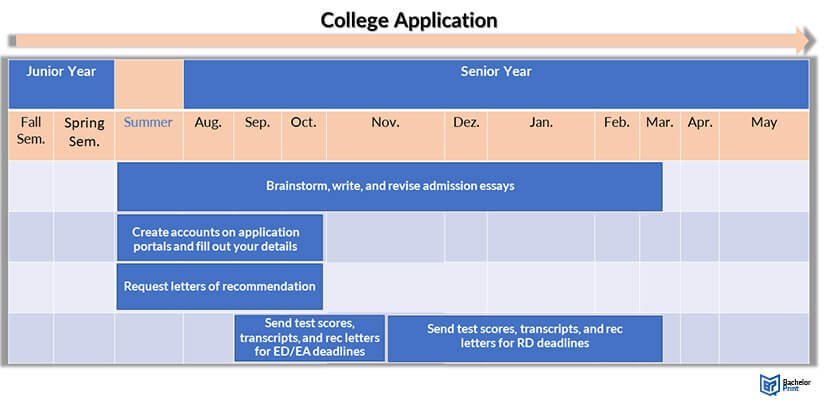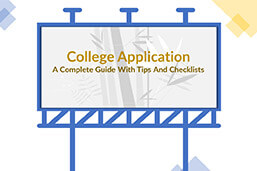
To gain entry into colleges, you have to make an application. This guide will walk you through the entire college application process.
Definition: College application
Once you finish high school or secondary school, you will need to make a college application. This process involves sending certain documents to the institution. Depending on the college you intend to join, these documents may include:1
- An application form
- Your high school transcripts
- An essay
- Test scores from the SAT or ACT
- Recommendation letters
Most schools will stop taking applications in November or January. 2
College application: Requirements
Let’s look at some requirements to make a college application.
The application form can be completed online or on paper. If you’re planning to apply to many colleges, you can consider using the Common Application. 3
Before making your college application, you should take the SAT or ACT test. Some colleges accept both tests, while others may only need one.3
This is a short document that is usually written by a teacher, counsellor , or mentor. It is meant to highlight your strengths and possible contributions to the institution.3
Colleges will also need a personal essay, usually between 300 and 500 words. This step is crucial and should be approached carefully. You should get a teacher to review your essay as this piece needs to be perfect.3
The procedure of sending transcripts will vary from one college to another. Some will require the school to send the transcripts directly, while others allow students to mail in the documents. 5
For your college application to be processed, you will have to pay a fee. This ranges around $60 and rarely goes above $77.6
Before applying for college
Let’s look at the steps you need to take before applying for college.
Researching colleges
You can follow these tips when researching colleges:
-
- Start by checking the courses offered and learn more about the professors in the college.
- Evaluate the internship opportunities available in the school
- Check the structure of the courses
- Check the average class size
- Consider social factors like the available clubs5
Financial aid
Before sending in your college application, you also need to apply for financial aid. This can be given as a scholarship, federal grant, federal loan, or work-study program. To get FAFSA aid, you can send an application to studentaid.gov. 6
College application: Step-by-step process
This section will outline the steps you should take to complete your college application.
-
Application deadlines
Your college application could take the form of early decision, early action, or regular decision.7 8
Admission type Due date Decision date Binding/non-binding Early decision 1 - 15 November By mid-December Binding Regular decision 1 - 15 November By April Non-binding Early action 1 - 15 November December, January, or February Non-binding -
Signing up for standardized testing
Standardized tests are administered in a consistent manner and measure the knowledge and skills of the students. The most popular ones are the SAT and ACT. You will usually have to take these tests in your junior or senior year.9
-
Personal statements
A strong personal statement will give the college an idea of who you are and why you should be admitted to the school. When writing a personal statement for your college application, you should focus on your strengths.10
-
Letters of recommendation
Your college application should also include a letter of recommendation. This is issued by a teacher or other staff members of your high school.
-
Submitting your transcripts
Your transcript will show the academic courses you attempted in high school. In most cases, the college will need the document four weeks before the college application deadline.
-
Filling out the application
The college application form features basic details about you and your application. You will need to provide personal information like your name, age, and contact details. You also have to indicate the course you want to take, as well as the semester you intend to join. The college application form also includes information on your high school experience.
-
Double-checking & submitting the application
Before you submit your college application, you should ensure that all the documents are there. You can then send the files and pay the college application fee.
College application: Timeline
Use the college application timeline to make sure you don’t miss any important steps on your way to applying to college.
numerous advantages for Canadian students:
- ✓ 3D live preview of your configuration
- ✓ Free express delivery for every order
- ✓ High-quality bindings with individual embossing

College application: Checklist
- Create a list of suitable colleges
- Take note of the deadline
- Request high school transcripts
- Send your SAT scores
- Take any other required tests
- Request letters of recommendation
- draught your essay
- Proofread your essay
- Have two or more teachers go through the essay
- Revise the essay
- Submit FAFSA application
- Make copies of all college application materials
- Pay the application fee
- Fill out the application form
- Send an email to colleges that you won’t attend
FAQs
To start the college application process, you should get the necessary documents. These include your transcript and personal essay.
Most colleges check your SAT or ACT scores before admission.
This document is usually sent by high school officials.
It is advisable to get at least 2 recommendation letters.
Sources
1 New Visions for Public Schools. “Components of the College Application.” Accessed February 16, 2023. https://www.newvisions.org/pages/components-of-the-college-application.
2 Safier, Rebecca. “Colleges With Late Application Deadlines: Complete List.” PrepScholar. December 4, 2022. https://blog.prepscholar.com/colleges-with-late-application-deadlines-complete-list.
3 CollegeChoice. “How to Apply for College.” January 31, 2023. https://www.collegechoice.net/choosing-a-college/admissions/college-application-requirements/.
4 Khan Academy. “College Application Checklist.” Accessed February 16, 2023. https://www.khanacademy.org/college-careers-more/college-admissions/applying-to-college/college-application-process/a/college-application-checklist.
5 Ivy Wise. “How to Research a College Effectively.” Accessed February 16, 2023. https://www.ivywise.com/ivywise-knowledgebase/resources/article/how-to-research-a-college-effectively/.
6 Federal Student Aid. “How do I Apply for a Federal Student Loan?” Accessed February 16, 2023. https://studentaid.gov/help-center/answers/article/how-to-apply-for-federal-student-loan.
7 Boston College. “Early Decision vs. Regular Decision.” Accessed February 16, 2023. https://www.bc.edu/bc-web/admission/apply/early-decision.html.
8 Ngo, Chinh. “Early Action vs. Early Decision: How to Choose.” Best Colleges. May 6, 2022. https://www.bestcolleges.com/blog/early-action-vs-early-decision/.
9 Big Future. “College Application Checklist,” Accessed February 16, 2023. https://bigfuture.collegeboard.org/plan-for-college/applying-to-college/tests/8-things-to-know-about-how-colleges-use-admission-tests.
10 Olah, Dora. “10 Tips for Writing a Personal Statement for University Applications.” Top Universities. April 19, 2021. https://www.topuniversities.com/blog/10-tips-writing-personal-statement-university-applications.

